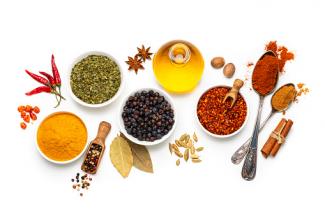Improving your health with spices: What you need to know!

If we look back in time, a common diet theme found in tribes all around the world is the use of spices. From food flavoring and coloring to medicinal remedies, spices and herbs have been around for thousands of years. Research has shown us that spices convey many health benefits, but most importantly throughout history as a way to preserve food. That’s because all herbs and spices have strong anti-microbial properties. They essentially concentrate all the disease fighting properties from plants into tiny little packages. This means you don’t have to eat enormous quantities of these foods to get the benefits and protection.
The trading of spices was a huge part the development of civilizations, and for good reason– many were considered to be more valuable than gold. Spices come from the bark, root, or other parts of tropical plants and trees, and are typically used dried or ground.
Some of their health benefits include:
Heart Health
A good alternative to reduce sodium intake is the use of herbs and spices, which should have a positive effect in your heart health. Spices like black pepper, garlic powder, curry powder, cumin, dill, basil, ginger, coriander, and onion are the most effective herbs and spices in replacing the taste of salt.
Immune Protection
With their anti-microbial properties, spices can help the body fight off infection. Modulating inflammation is important in keeping the immune system working properly. Because of their antioxidant effect, spices can boost the immune system and positively impact the level of inflammation in the body. These properties are why spices are used to ward off colds and flu, lower cancer risk, decrease allergies and arthritis symptoms, help to manage pain, as well as lower the risk of autoimmune disease and other inflammatory driven diseases.
Antioxidants
These colorful substances found in plant foods help protect your cells against damage from aging, the environment, and other stressors. Herbs and spices are particularly good sources of antioxidants. For example, ½ of a teaspoon of cloves has more antioxidants than ½ of a cup of blueberries! The herbs and spices with the most antioxidants include oregano, sage, peppermint, lemon balm, clove, and cinnamon.
Spices and herbs add a delicious variety to the foods we eat. Also, when cooking time is in short supply, spices are an easy way to accentuate simply prepared whole foods such as fish, meat, chicken, vegetables, whole grains, and lentils. Try to prepare spice rubs and pastes in advance so they are ready and waiting when it’s time to pull a meal together.
